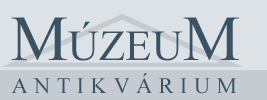kategóriák
- Közlekedés ajánlójegyzék
- Szocreál ajánlójegyzék
- Reklám ajánlójegyzék
- Fotó ajánlójegyzék
- Kínai-japán ajánlójegyzék
- Szentkép ajánlójegyzék
Új árakkal! - Új szentkép ajánlójegyzék II.
- 12 érdekes régiség
 Könyv
Könyv
 Bibliofilia
Bibliofilia
 Régiség
Régiség
 Metszet
Metszet
 Térkép
Térkép
 Fotó
Fotó
 Papírrégiség, Aprónyomtatvány
Papírrégiség, Aprónyomtatvány
 Plakát
Plakát
- Cirkusz
- Modern grafika
- Szocreál
- NER Irodalom
- Egyéb
kosár
üres a kosár
nincs bejelentkezve
Dostoevsky, Fyodor [Dosztojevszkij, Fjodor] : Devils
- leírás
- további adatok
Series: Wordswords Classics
In 1869 a young Russian was strangled, shot through the head and thrown into a pond. His crime? A wish to leave a small group of violent revolutionaries, from which he had become alienated. Dostoevsky takes this real-life catastophe as the subject and culmination of Devils, a title that refers to the young radicals themselves and also to the materialistic ideas that possessed the minds of many thinking people in Russian society at the time. The satirical portraits of the revolutionaries, with their naivety, ludicrous single-mindedness and readiness for murder and destruction, might seem exaggerated - until we consider their all-too-recognisable descendants in the real world ever since. The key figure in the novel, however is beyond politics. Nikolay Stavrogin, another product of rationalism run wild, exercises his charisma with ruthless authority and total amorality. His unhappiness is accounted for when he confesses to a ghastly sexual crime - in a chapter long suppressed by the censor. This prophetic account of modern morals and politics, with its fifty-odd characters, amazing events and challenging ideas, is seen by some critics as Dostoevsky's masterpiece.
In 1869 a young Russian was strangled, shot through the head and thrown into a pond. His crime? A wish to leave a small group of violent revolutionaries, from which he had become alienated. Dostoevsky takes this real-life catastophe as the subject and culmination of Devils, a title that refers to the young radicals themselves and also to the materialistic ideas that possessed the minds of many thinking people in Russian society at the time. The satirical portraits of the revolutionaries, with their naivety, ludicrous single-mindedness and readiness for murder and destruction, might seem exaggerated - until we consider their all-too-recognisable descendants in the real world ever since. The key figure in the novel, however is beyond politics. Nikolay Stavrogin, another product of rationalism run wild, exercises his charisma with ruthless authority and total amorality. His unhappiness is accounted for when he confesses to a ghastly sexual crime - in a chapter long suppressed by the censor. This prophetic account of modern morals and politics, with its fifty-odd characters, amazing events and challenging ideas, is seen by some critics as Dostoevsky's masterpiece.
| állapot: |      |
| kategória: | Könyv > Idegennyelvű könyvek > Angol nyelvű > Angol nyelvű irodalom > |
| kategória: | Könyv > Szépirodalom > Próza > |
| kiadó: | Wordsworth, 2005 |
| cikkszám / ISBN: | 9781840221282 |
| kötés: | fűzve |
| oldalszám: | 693 |
| könyv nyelve: | angol |





![Dostoevsky, Fyodor [Dosztojevszkij, Fjodor] : Devils Dostoevsky, Fyodor [Dosztojevszkij, Fjodor] : Devils](/images/item_image/200/106491.jpg)
![Dostoevsky, Fyodor [Dosztojevszkij, Fjodor] : Crime and Punishment Dostoevsky, Fyodor [Dosztojevszkij, Fjodor] : Crime and Punishment](/images/item_image/100/99790.jpg)



 Telefon:
Telefon: E-mail:
E-mail:







